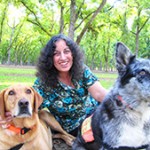Newbery Honor winning author Margarita Engle grew up in Los Angeles, the daughter of an American father and a Cuban mother. Her parents met when her artist-father visited Cuba to paint. They fell in love at first sight and married despite language obstacles. Engle recalls magical summer adventures in Cuba on her mother’s family farm. Where Los Angeles was paved and gray, Cuba was green and natural. There was little opportunity for Engle to run wild at home, but in Cuba she spent much of her time outdoors. “For me, riding horses on the farm symbolizes the freedom that I felt during those summers,” she says.
But in 1962 when Engle was eleven, the Cuban Missile Crisis brought her summer adventures to an abrupt halt. “Between the time of the missile crisis and the fall of the Soviet Union it was impossible [to travel to Cuba],” she says. “We weren’t even able to maintain regular phone or written contact with family. It was a real separation of the two sides of the family. Even now [fifty-plus years later] there is not direct mail service to Cuba.” Although family visits are now legal, letters can take up to a year or more to arrive if they arrive at all, and Internet access is nonexistent for the average Cuban.
The loss of her extended family was so great a deprivation at the age of eleven that Engle began to think of Cuba as an imaginary place. She describes it as “magic realistic where I could travel in memory and imagination.” Even though she has visited Cuba several times since the collapse of the Soviet Union, she says, “Cuba remains both a real place and that world I created when I couldn’t travel.”
Engle’s professional writing career began in the 1990s when she published prose novels for adults. “When I was a child at about age ten I started reading adult books instead of children’s books, ” she says. “I was already writing poetry, and it never occurred to me that I would write for children. I wanted to read adult books and I wanted to write for adults. I remember as a teenager thinking that I wanted to write big, fat books.” But her tastes changed when she had children, and she began to think about writing books for young readers. As her children grew up, her interest in children’s books grew. “I kind of have done my reading and writing in reverse,” she quips. “The older I get, the more I enjoy children’s books.”
She turned to her beloved Cuba for her first book, The Poet Slave of Cuba, a biography of the slave Juan Francisco Manzano who escaped and became a celebrated poet. “I tried to write in prose, but it just never worked,” Engle says. About that time, she read Karen Hesse’s Witness—a verse novel in multiple voices—and it inspired Engle to reformat her project. “When I switched to poetry, it flowed,” she says. An editor at Henry Holt pulledThe Poet Slave of Cuba from a pile of unsolicited manuscripts and launched Engle’s career as a verse novelist.
Mining her family history, Engle remembered stories of a pirate ancestor from the 1700s. Many of his papers had been donated to Harvard, but the university would not grant her access because she was not affiliated with a research institution. Engle changed direction and became fascinated with a Caribbean pirate shipwreck in 1509 near her mother’s hometown on the south central coast of Cuba—a shipwreck that brought Cuban Indians in touch with outsiders for the first time. “I am fascinated by points where cultures meet,” Engle says, and she wove a peacekeeping theme into Hurricane Dancers. In an additional twist, she says, “I grew up believing that Cuban Indians were extinct.” Because of her research on this project, she was invited to take part in a Cuban DNA Project. She discovered that not only were Cuban Indians not extinct, but that she shared their blood. “The story that had already captivated me was my own,” she says. “It became very emotional for me to know there had been survivors, so Hurricane Dancers became a story about survival, too, not just peacekeeping.”
In her newest picture book, Engle returns to Cuba once again, this time using the framework of a folktale for Tiny Rabbit’s BIG WISH. “It’s “a story about learning to accept yourself,” Engle says. In other new work, Engle veers away from Cuba for her middle-grades novel Mountain Dog and her picture book When You Wander, both based on her search and rescue dogs. Silver People explores the culture of Caribbean islanders recruited by the United States to dig the Panama Canal in the early 1900s. “They lived under a U.S. imposed system of apartheid,” Engle says, “segregated until the middle of the 20th century.” While American and European workers were paid in gold, the Caribbean islanders were paid in silver. “It’s a visual image of what it means to be a second class citizen,” she says. Her background in agronomy and botany shines through in this verse novel as she takes on different voices for native plants and animals. “The book teaches rain forest biology as well as history,” she says. “I think of it as my personal love letter to the rain forest.”
Engle continues to hope for normalized relations between the U.S. and Cuba so she can be reunited with her family. It seems unlikely that the current generation is up to the task, so Engle writes for the next generation.


